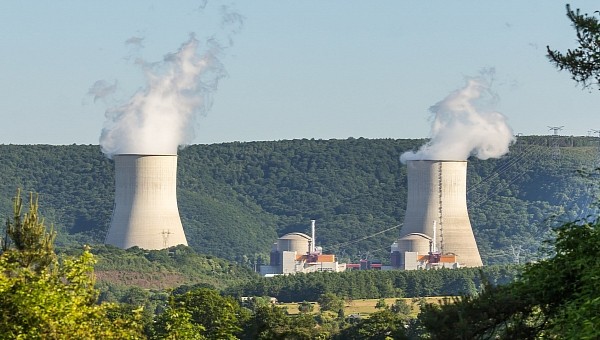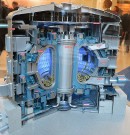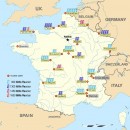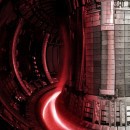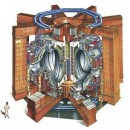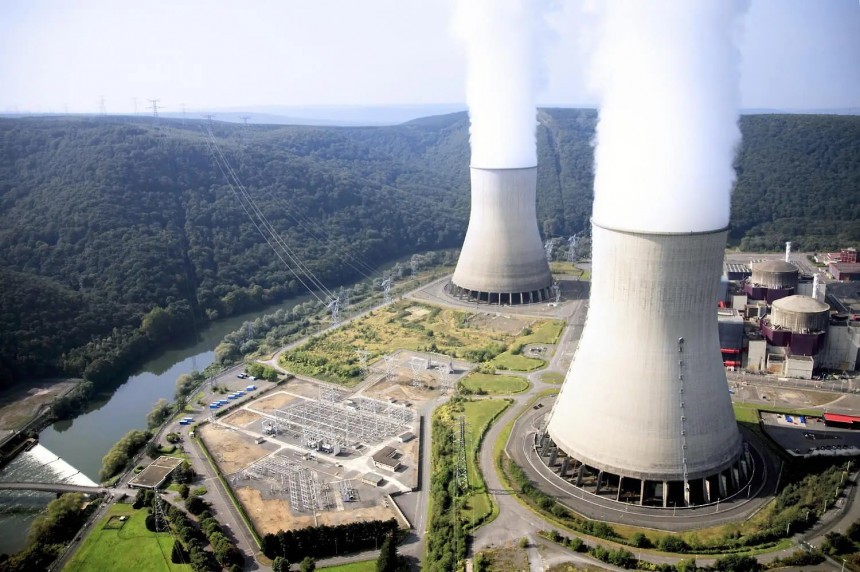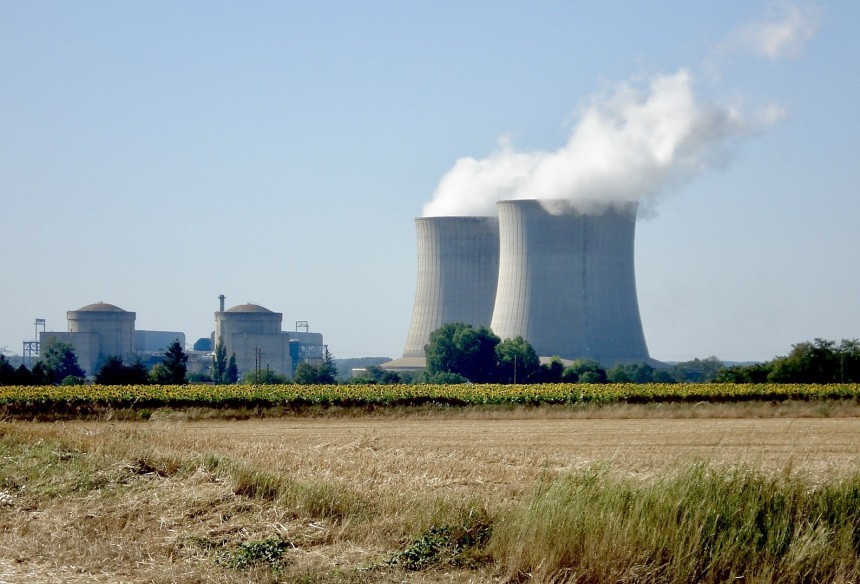European nations getting along in the present day is actually the exception to history rather than the norm. But even with the EU and NATO making most of Europe play nice with each other, Germany and France are finding ways to be at odds with one another. This time around, the focal point is the path forward for nuclear energy.
Reuters reports that seven EU states are rallying against ambitions in France to expand nuclear energy infrastructure in Europe. Germany leads the charge. In the wake of endless questions over the future of Europe's integrity in energy infrastructure, this is bound to get very ugly in a hurry if a solution isn't reached. Let's take a look at some details.
It took far more factors than just the Russian invasion of Ukraine to bring about Europe's modern energy snafus. The European continent's respective nations underwent bespoke and often radically different approaches to their national energy grids, in the aftermath of World War II. In the case of France especially, a drive to complete a fleet of nuclear fission reactors that'd be the toast of Europe became one of the definitive legacies of the Charles De Gaulle government.
Charles de Gaulle himself established France's first commercial nuclear research program while serving as Chairman of the Provisional Government of the French Republic. Essentially the newly restored-to-power leaders of the French government in exile returned to power following the liberation of Paris. Later on, in the 1970s, French Prime Minister Pierre Messmer implemented energy reforms that turned its nuclear grid into the titan it is today.
Meanwhile, over in Germany, the story couldn't be more different in 2023. The pre-war German nuclear program famously exiled many of its Jewish scientists and engineers following the rise of the Nazi Party in the early 1930s. Famous minds like Albert Einstein were among those who were forced to flee to the United States. The first commercial German nuclear reactor didn't come online until 1969.
That's 15 years after the first American commercial reactor in Shippingport, Pennsylvania, and 13 years after the first in French Service, the Marcoule Nuclear Power Plant near Bagnols-sur-Cèze in the French Gard department. Anti-nuclear sentiment among West Germany and later the re-united Federal Republic of Germany has been at the forefront of native society since the 1970s. At times, and especially after the Chornobyl (Chernobyl) disaster of 1986, these protests even escalated into riots.
Such sentiments were only emboldened by the 2011 meltdown of the Fukushima Daiichi Nuclear Plant in Japan following a devastating earthquake. No less than a few days after that decade-defining engineering disaster, protests from Berlin to Bavaria and everywhere in between made a profound statement. The public sentiment against nuclear energy in Germany had reached an all-time low.
As such, a national ordinance was declared by which eight German fission reactors localized in the north and south of the country were to be shut down and decommissioned by the early 2020s. All this history came to a head this month when a coalition led by Germany but also including Spain, Denmark, Ireland, Luxembourg, and Portugal made an appeal to the EU not to take inspiration from France in their mission to reach 100% carbon-free energy by 2030.
In accordance with universally accepted EU law, each nation represented in this appeal must submit their grievances to whichever country represents EU policy negotiations. In this case, this would be Sweden. Once submitted, the virtues of the EU's anti-nuclear coalition will be weighed against nations like France, Poland, and the Czech Republic, firmly in favor of bolstering nuclear research.
Taking place simultaneously alongside this pan-European squabble, nuclear energy research groups across the continent continue to make advances in fission and fusion power research. The world's largest Tokamak-class fusion reactor at the ITER facility in France is expected to finish production in 2025.
Meanwhile, a similarly sized and fully operational Tokamak resides in the U.K. under the Joint European Torus (JET) laboratory initiative.
It would seem as quickly as nuclear energy research in Europe makes quantum advancements, forces that seek to put a stop to it all continuously rise to counter it. Germany and several other nations in Europe may have been spared freezing to death under threat from gas cutoffs from Russia. But as the War in Ukraine rages, there's no guarantee this will be the case next winter or the winter after that.
Be it solar power, geothermal energy, wind turbines, or other more novel eco-conscious energy sources, it's hard to argue that any of these are quite as powerful as what modern safety-guarded nuclear fission reactors can be. Though the debate on dealing with the problem of nuclear waste disposal remains as fiery as ever, it's possible Germany and its anti-atomic coalition may one day come to regret their decision to turn their back on nuclear energy.
It took far more factors than just the Russian invasion of Ukraine to bring about Europe's modern energy snafus. The European continent's respective nations underwent bespoke and often radically different approaches to their national energy grids, in the aftermath of World War II. In the case of France especially, a drive to complete a fleet of nuclear fission reactors that'd be the toast of Europe became one of the definitive legacies of the Charles De Gaulle government.
Charles de Gaulle himself established France's first commercial nuclear research program while serving as Chairman of the Provisional Government of the French Republic. Essentially the newly restored-to-power leaders of the French government in exile returned to power following the liberation of Paris. Later on, in the 1970s, French Prime Minister Pierre Messmer implemented energy reforms that turned its nuclear grid into the titan it is today.
Meanwhile, over in Germany, the story couldn't be more different in 2023. The pre-war German nuclear program famously exiled many of its Jewish scientists and engineers following the rise of the Nazi Party in the early 1930s. Famous minds like Albert Einstein were among those who were forced to flee to the United States. The first commercial German nuclear reactor didn't come online until 1969.
Such sentiments were only emboldened by the 2011 meltdown of the Fukushima Daiichi Nuclear Plant in Japan following a devastating earthquake. No less than a few days after that decade-defining engineering disaster, protests from Berlin to Bavaria and everywhere in between made a profound statement. The public sentiment against nuclear energy in Germany had reached an all-time low.
As such, a national ordinance was declared by which eight German fission reactors localized in the north and south of the country were to be shut down and decommissioned by the early 2020s. All this history came to a head this month when a coalition led by Germany but also including Spain, Denmark, Ireland, Luxembourg, and Portugal made an appeal to the EU not to take inspiration from France in their mission to reach 100% carbon-free energy by 2030.
In accordance with universally accepted EU law, each nation represented in this appeal must submit their grievances to whichever country represents EU policy negotiations. In this case, this would be Sweden. Once submitted, the virtues of the EU's anti-nuclear coalition will be weighed against nations like France, Poland, and the Czech Republic, firmly in favor of bolstering nuclear research.
Meanwhile, a similarly sized and fully operational Tokamak resides in the U.K. under the Joint European Torus (JET) laboratory initiative.
It would seem as quickly as nuclear energy research in Europe makes quantum advancements, forces that seek to put a stop to it all continuously rise to counter it. Germany and several other nations in Europe may have been spared freezing to death under threat from gas cutoffs from Russia. But as the War in Ukraine rages, there's no guarantee this will be the case next winter or the winter after that.
Be it solar power, geothermal energy, wind turbines, or other more novel eco-conscious energy sources, it's hard to argue that any of these are quite as powerful as what modern safety-guarded nuclear fission reactors can be. Though the debate on dealing with the problem of nuclear waste disposal remains as fiery as ever, it's possible Germany and its anti-atomic coalition may one day come to regret their decision to turn their back on nuclear energy.
